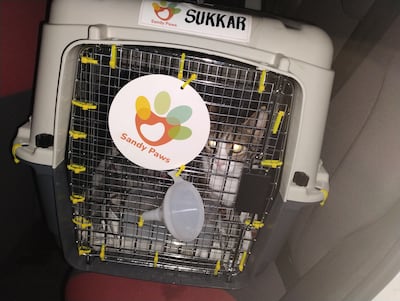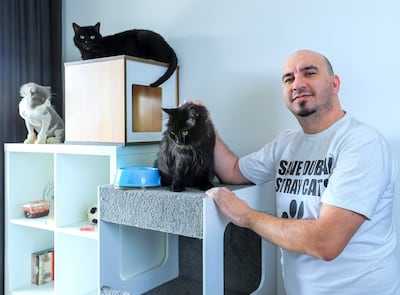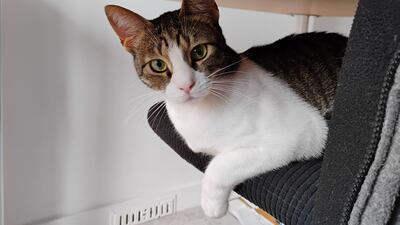It was early evening and I was among a group of people waiting in a car park near London’s Heathrow Airport for a very special delivery to arrive from the UAE.
Amid much expectation, a white van eventually pulled in and its rear doors opened to reveal the shipments that we were here to collect: multiple plastic crates, each containing one or two cats.
The driver called out the name of my feline air freight, Sukkar, the Arabic word for sugar, a one-year-old former street cat who had used up several of his nine lives in his short but turbulent existence.
Thanks to much veterinary care organised by his rescuer, Sukkar had overcome an infection of an often-fatal condition called feline infectious peritonitis, and because of gum inflammation he had most of this teeth removed.
He was the only surviving cat from a litter of at least three, with both of his brothers having fallen ill and disappeared from the streets.
Later that evening, after reaching my house in eastern England, I opened the crate and Sukkar gingerly crept out into his new home.
Jet-setting pets
A good-natured tabby and white cat – a colour combination common among the UAE’s strays – he was one of 13 cats who that day flew on an Etihad service from Abu Dhabi to London.
Each year the number of former street cats from the UAE adopted overseas is thought to run into the hundreds at least, with many travelling to the UK, Germany and even the US.
Adoptions abroad may offer stability for former stray animals who have often known only illness or injury on the streets.
Aileen Velazquez, an Ajman resident who has been rescuing and rehoming stray cats for many years, said that adopting abroad was often “a more viable solution” than trying to find homes in the UAE.
In many foreign countries there are fewer stray cats, she said, which “increases the chances” of UAE cats finding people who will welcome them into their homes.
Also, she said that cats adopted in the UAE are sometimes returned to rescuers or passed on to friends because when expatriates leave the country, they often do not take cats with them.
“Finding homes for disabled cats in the UAE is particularly challenging, as many residents are temporary and may hesitate to take on such responsibilities,” she said.
“Facilitating the relocation of these cats to where they can be better cared for and have better adoption prospects seems like a compassionate and logical solution.”
A crucial lifeline
Fawaz Kanaan, a Syrian events organiser in Dubai who has been rehoming stray cats for many years, said that some cats rescued from the streets were pets that had been dumped.
He said that people often found that they could not cover vet fees or day-to-day costs of pet ownership and so discarded their cats, with many turning up in local parks.
Another issue highlighted by rescuers is that when expatriates return to their home countries, they may stay with family or rent and so be unable to have their cat living with them. As a result, the pet may end up on the streets when the owner leaves the UAE.
“Every day we see new cats,” Mr Kanaan said. “Most are really good breeds. They’re clean and healthy. Obviously, they’re dumped cats.”
Other street cats, like Sukkar, are born on the streets to stray mothers.
A key problem, said Mr Kanaan, who has lived in the UAE for 25 years, is that many rescuers “are full” with cats and cannot take any more.
“I’m fostering 12 cats on top of my own four cats,” he said. “It’s hard to rehome one cat. It’s really, really difficult. That’s why everyone focuses on adopting abroad.”
Specialist relocation companies can organise travel for cats going abroad, and in some destination countries pet taxi services deliver animals to their new home.
But adopting abroad is not necessarily cheap. Ms Velazquez said that the price of relocation – which can run into thousands of dirhams – put off some potential adopters, although rescuers sometimes raised funds to cover most of the costs.
To reduce costs, rescuers may make arrangements themselves, although this typically requires finding a “flight buddy”, a passenger on the same flight as the cat, who assists with the travel logistics. Some airlines allow cats to travel in the passenger cabin as carry-on baggage.
“We arrange the paperwork 21 days before, to ensure they get the rabies vaccination,” Mr Kanaan said. “They will get a health certificate and check the vaccination is up to date, and scan the microchip to ensure the cat is not lost or stolen.
“I know how to manage it. Doing the paperwork, it’s easy. Finding a flight buddy at a certain time is the difficult thing.”
Mr Kanaan estimates that nearly 100 cats that he has rescued have been adopted abroad, with more than 30 travelling to the Netherlands alone. Others have gone to countries including Germany, the US, Russia and Switzerland.
Home support
While many cats from the UAE are adopted abroad, significant numbers do find homes in the Emirates, including with individuals who have rescued the cat from the streets themselves.
Meanwhile, a government-backed animal welfare programme launched in Abu Dhabi last year is calling on volunteers to sign up online to help at feeding stations at designated areas across the emirate.
If someone finds a stray that they would like to adopt, Mr Kanaan said an essential first step is to take the cat to a vet to check for a microchip, which could indicate if the animal already has an owner.
“The vets all have the same system,” he said. “If it’s a lost cat, the owner will come and pick it up … If it doesn’t have a microchip, it’s 100 per cent a stray.”
If there is no microchip, the vet will be able to insert one, give the required vaccinations, deworm the cat and protect it from fleas.
While rescuing a stray can be rewarding for both the cat and the new owner, Mr Kanaan said that taking on a feline was not to be taken lightly, describing it as like “having a baby”.
“Once you have it in your home, you’re responsible until the end of time,” he said. “Every cat will get sick one day, especially if it’s been on the streets and has a disease that doesn’t show up. People should be committed to having an animal until the last day of its life.”
KILLING OF QASSEM SULEIMANI
UAE currency: the story behind the money in your pockets
The specs: 2019 Subaru Forester
Price, base: Dh105,900 (Premium); Dh115,900 (Sport)
Engine: 2.5-litre four-cylinder
Transmission: Continuously variable transmission
Power: 182hp @ 5,800rpm
Torque: 239Nm @ 4,400rpm
Fuel economy, combined: 8.1L / 100km (estimated)
Zayed Sustainability Prize
UAE currency: the story behind the money in your pockets
F1 The Movie
Starring: Brad Pitt, Damson Idris, Kerry Condon, Javier Bardem
Director: Joseph Kosinski
Rating: 4/5
The years Ramadan fell in May
Read more about the coronavirus
Mohammed bin Zayed Majlis
Points about the fast fashion industry Celine Hajjar wants everyone to know
- Fast fashion is responsible for up to 10 per cent of global carbon emissions
- Fast fashion is responsible for 24 per cent of the world's insecticides
- Synthetic fibres that make up the average garment can take hundreds of years to biodegrade
- Fast fashion labour workers make 80 per cent less than the required salary to live
- 27 million fast fashion workers worldwide suffer from work-related illnesses and diseases
- Hundreds of thousands of fast fashion labourers work without rights or protection and 80 per cent of them are women
ICC Awards for 2021
MEN
Cricketer of the Year – Shaheen Afridi (Pakistan)
T20 Cricketer of the Year – Mohammad Rizwan (Pakistan)
ODI Cricketer of the Year – Babar Azam (Pakistan)
Test Cricketer of the Year – Joe Root (England)
WOMEN
Cricketer of the Year – Smriti Mandhana (India)
ODI Cricketer of the Year – Lizelle Lee (South Africa)
T20 Cricketer of the Year – Tammy Beaumont (England)
Cricket World Cup League 2
UAE squad
Rahul Chopra (captain), Aayan Afzal Khan, Ali Naseer, Aryansh Sharma, Basil Hameed, Dhruv Parashar, Junaid Siddique, Muhammad Farooq, Muhammad Jawadullah, Muhammad Waseem, Omid Rahman, Rahul Bhatia, Tanish Suri, Vishnu Sukumaran, Vriitya Aravind
Fixtures
Friday, November 1 – Oman v UAE
Sunday, November 3 – UAE v Netherlands
Thursday, November 7 – UAE v Oman
Saturday, November 9 – Netherlands v UAE
Ballon d’Or shortlists
Men
Sadio Mane (Senegal/Liverpool), Sergio Aguero (Aregentina/Manchester City), Frenkie de Jong (Netherlans/Barcelona), Hugo Lloris (France/Tottenham), Dusan Tadic (Serbia/Ajax), Kylian Mbappe (France/PSG), Trent Alexander-Arnold (England/Liverpool), Donny van de Beek (Netherlands/Ajax), Pierre-Emerick Aubameyang (Gabon/Arsenal), Marc-Andre ter Stegen (Germany/Barcelona), Cristiano Ronaldo (Portugal/Juventus), Alisson (Brazil/Liverpool), Matthijs de Ligt (Netherlands/Juventus), Karim Benzema (France/Real Madrid), Georginio Wijnaldum (Netherlands/Liverpool), Virgil van Dijk (Netherlands/Liverpool), Bernardo Silva (Portugal/Manchester City), Son Heung-min (South Korea/Tottenham), Robert Lewandowski (Poland/Bayern Munich), Roberto Firmino (Brazil/Liverpool), Lionel Messi (Argentina/Barcelona), Riyad Mahrez (Algeria/Manchester City), Kevin De Bruyne (Belgium/Manchester City), Kalidou Koulibaly (Senegal/Napoli), Antoine Griezmann (France/Barcelona), Mohamed Salah (Egypt/Liverpool), Eden Hazard (BEL/Real Madrid), Marquinhos (Brazil/Paris-SG), Raheem Sterling (Eengland/Manchester City), Joao Félix(Portugal/Atletico Madrid)
Women
Sam Kerr (Austria/Chelsea), Ellen White (England/Manchester City), Nilla Fischer (Sweden/Linkopings), Amandine Henry (France/Lyon), Lucy Bronze(England/Lyon), Alex Morgan (USA/Orlando Pride), Vivianne Miedema (Netherlands/Arsenal), Dzsenifer Marozsan (Germany/Lyon), Pernille Harder (Denmark/Wolfsburg), Sarah Bouhaddi (France/Lyon), Megan Rapinoe (USA/Reign FC), Lieke Martens (Netherlands/Barcelona), Sari van Veenendal (Netherlands/Atletico Madrid), Wendie Renard (France/Lyon), Rose Lavelle(USA/Washington Spirit), Marta (Brazil/Orlando Pride), Ada Hegerberg (Norway/Lyon), Kosovare Asllani (Sweden/CD Tacon), Sofia Jakobsson (Sweden/CD Tacon), Tobin Heath (USA/Portland Thorns)
Killing of Qassem Suleimani
Killing of Qassem Suleimani
The%20specs%20
%3Cp%3E%3Cstrong%3EEngine%3A%20%3C%2Fstrong%3E2.0-litre%204cyl%20turbo%0D%3Cbr%3E%3Cstrong%3EPower%3A%20%3C%2Fstrong%3E261hp%20at%205%2C500rpm%0D%3Cbr%3E%3Cstrong%3ETorque%3A%20%3C%2Fstrong%3E400Nm%20at%201%2C750-4%2C000rpm%0D%3Cbr%3E%3Cstrong%3ETransmission%3A%20%3C%2Fstrong%3E7-speed%20dual-clutch%20auto%0D%3Cbr%3E%3Cstrong%3EFuel%20consumption%3A%20%3C%2Fstrong%3E10.5L%2F100km%0D%3Cbr%3E%3Cstrong%3EOn%20sale%3A%20%3C%2Fstrong%3ENow%0D%3Cbr%3E%3Cstrong%3EPrice%3A%20%3C%2Fstrong%3EFrom%20Dh129%2C999%20(VX%20Luxury)%3B%20from%20Dh149%2C999%20(VX%20Black%20Gold)%3C%2Fp%3E%0A
More on animal trafficking
UAE currency: the story behind the money in your pockets
EPL's youngest
- Ethan Nwaneri (Arsenal)
15 years, 181 days old
- Max Dowman (Arsenal)
15 years, 235 days old
- Jeremy Monga (Leicester)
15 years, 271 days old
- Harvey Elliott (Fulham)
16 years, 30 days old
- Matthew Briggs (Fulham)
16 years, 68 days old
UAE currency: the story behind the money in your pockets
Killing of Qassem Suleimani
Killing of Qassem Suleimani
COMPANY%20PROFILE
%3Cp%3E%3Cstrong%3EName%3A%3C%2Fstrong%3E%20SupplyVan%3Cbr%3E%3Cstrong%3EBased%3A%3C%2Fstrong%3E%20Dubai%2C%20UAE%3Cbr%3E%3Cstrong%3ELaunch%20year%3A%3C%2Fstrong%3E%202017%3Cbr%3E%3Cstrong%3ENumber%20of%20employees%3A%3C%2Fstrong%3E%2029%3Cbr%3E%3Cstrong%3ESector%3A%3C%2Fstrong%3E%20MRO%20and%20e-commerce%3Cbr%3E%3Cstrong%3EFunding%3A%3C%2Fstrong%3E%20Seed%3C%2Fp%3E%0A
Killing of Qassem Suleimani
Brief scores:
Day 2
England: 277 & 19-0
West Indies: 154
Red flags
- Promises of high, fixed or 'guaranteed' returns.
- Unregulated structured products or complex investments often used to bypass traditional safeguards.
- Lack of clear information, vague language, no access to audited financials.
- Overseas companies targeting investors in other jurisdictions - this can make legal recovery difficult.
- Hard-selling tactics - creating urgency, offering 'exclusive' deals.
Courtesy: Carol Glynn, founder of Conscious Finance Coaching
AS%20WE%20EXIST
%3Cp%3EAuthor%3A%20Kaoutar%20Harchi%C2%A0%3C%2Fp%3E%0A%3Cp%3EPublisher%3A%20Other%20Press%3C%2Fp%3E%0A%3Cp%3EPages%3A%20176%3C%2Fp%3E%0A%3Cp%3EAvailable%3A%20Now%3C%2Fp%3E%0A
The five pillars of Islam
1. Fasting
2. Prayer
3. Hajj
4. Shahada
5. Zakat
Zayed Sustainability Prize
SHAITTAN
%3Cp%3E%3Cstrong%3EDirector%3A%20%3C%2Fstrong%3EVikas%20Bahl%3Cbr%3E%3Cstrong%3EStarring%3A%20%3C%2Fstrong%3EAjay%20Devgn%2C%20R.%20Madhavan%2C%20Jyothika%2C%20Janaki%20Bodiwala%3Cbr%3E%3Cstrong%3ERating%3A%20%3C%2Fstrong%3E3%2F5%3C%2Fp%3E%0A
Farage on Muslim Brotherhood
Nigel Farage told Reform's annual conference that the party will proscribe the Muslim Brotherhood if he becomes Prime Minister.
"We will stop dangerous organisations with links to terrorism operating in our country," he said. "Quite why we've been so gutless about this – both Labour and Conservative – I don't know.
“All across the Middle East, countries have banned and proscribed the Muslim Brotherhood as a dangerous organisation. We will do the very same.”
It is 10 years since a ground-breaking report into the Muslim Brotherhood by Sir John Jenkins.
Among the former diplomat's findings was an assessment that “the use of extreme violence in the pursuit of the perfect Islamic society” has “never been institutionally disowned” by the movement.
The prime minister at the time, David Cameron, who commissioned the report, said membership or association with the Muslim Brotherhood was a "possible indicator of extremism" but it would not be banned.
The specs
AT4 Ultimate, as tested
Engine: 6.2-litre V8
Power: 420hp
Torque: 623Nm
Transmission: 10-speed automatic
Price: From Dh330,800 (Elevation: Dh236,400; AT4: Dh286,800; Denali: Dh345,800)
On sale: Now
The specs
Engine: 2.0-litre 4cyl turbo
Power: 261hp at 5,500rpm
Torque: 405Nm at 1,750-3,500rpm
Transmission: 9-speed auto
Fuel consumption: 6.9L/100km
On sale: Now
Price: From Dh117,059
KILLING OF QASSEM SULEIMANI
UPI facts
More than 2.2 million Indian tourists arrived in UAE in 2023
More than 3.5 million Indians reside in UAE
Indian tourists can make purchases in UAE using rupee accounts in India through QR-code-based UPI real-time payment systems
Indian residents in UAE can use their non-resident NRO and NRE accounts held in Indian banks linked to a UAE mobile number for UPI transactions
A timeline of the Historical Dictionary of the Arabic Language
- 2018: Formal work begins
- November 2021: First 17 volumes launched
- November 2022: Additional 19 volumes released
- October 2023: Another 31 volumes released
- November 2024: All 127 volumes completed
Key facilities
- Olympic-size swimming pool with a split bulkhead for multi-use configurations, including water polo and 50m/25m training lanes
- Premier League-standard football pitch
- 400m Olympic running track
- NBA-spec basketball court with auditorium
- 600-seat auditorium
- Spaces for historical and cultural exploration
- An elevated football field that doubles as a helipad
- Specialist robotics and science laboratories
- AR and VR-enabled learning centres
- Disruption Lab and Research Centre for developing entrepreneurial skills





